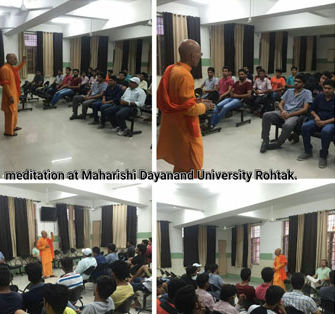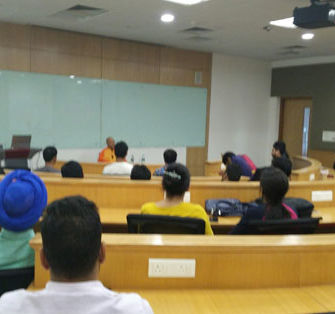What are four types of Karmas (Actions) ? Meditation is which Karma ?
Gurudev:
Shrimad Bhagwat Gita chapter 18 verse 36-37
सुखं त्विदानीं त्रिविधं श्रृणु मे भरतर्षभ।
अभ्यासाद्रमते यत्र दुःखान्तं च निगच्छति॥
यत्तदग्रे विषमिव परिणामेऽमृतोपमम्।
तत्सुखं सात्त्विकं प्रोक्तमात्मबुद्धिप्रसादजम्॥
And now hear from Me, O Best among the Bharatas, of the threefold pleasure in which one rejoices by practice and by which one comes to the end of sorrow, that which is like poison at first but in the end like nectar - that pleasure is declared to be Sattvic, springing from a clear understanding of the self.
Pleasures which will result in permanent eradication of sorrow and permanent establishment of bliss are satvik. Pleasure of meditation is the only pure satvik pleasure. There are four types of actions described in Vedic literature.
1. Nitya karma i.e. Necessary actions,
2. Naimittik karma which are necessary only in order to be able to do the Nitya karma,
3. Kamya karma , which is not not necessary and depends on one's liking, and
4. Nishiddh karma which are prohibited.
Nitya karma is meditation. All other usual activities like eating, earning money etc. are Naimittik . If one can afford to do Nitya karma without these activities, they can be dispensed with.
One who is fully focussed on the Nitya karma finds no time for the kamya category. And of course no thinking person will do Nishiddh karma as they are hiderances in achievement of final goal of permanent happiness.
How to understand corporate strategies & life in light of Bhagvat Gita ?
Start with first shloka of Bhagavad Gita 1.1
धृतराष्ट्र उवाच
धर्मक्षेत्रे कुरुक्षेत्रे समवेता युयुत्सवः।
मामकाः पाण्डवाश्चैव किमकुर्वत सञ्जय।।
dharma-ksetre kuru-ksetre samaveta yuyutsavah
mamakah pandavas caiva kim akurvata sanjaya
Dhritarashtra said: O Sanjaya, after my sons and the sons of Pandu assembled in the place of pilgrimage at Kurukshetra, desiring to fight, what did they do?
Gurudev :
In the end, for any business organisation the aim is to earn profits. Now the question remains whether the profits we want immediately or we are planning for long term growth of profit. In the ultimate analysis, the most profitable organisations are those which produce maximum good for maximum number of people. Google is a very good example as the impetus for the work was to make all knowledge available to everyone instantly.
If this is what everybody wants then it was thought that somehow or the other the profit will start coming. This attitude is Dharma. So the real field in which a business organisation must function is in the field of Dharma a Dharma Kshetra धर्मक्षेत्र.
Of course it's not just the good intentions that are important but then one has to work hard for that and that is the field of action the Kuru Kshetra कुरुक्षेत्र
If our organisation is doing very well then it is very easy to get deluded in the idea that we are the only ones who can provide this service or these goods. Competition may not be present in the beginning but sooner or later competition is bound to come and if we stay away from competition we will become outdated. So we should seek out people who are willing to compete with us that is what will make an organisation always remain on its toes. युयुत्सवः means those desirous of the battle in the field of business. Competition is a battle.
Another problem that can happen in the attitude of an organisation is that instead of thinking about what is the requirement of our clients we start to try to sell the product that we already have. That my product should sell. Whether there is a need for it or not become secondary. मामकाः in this shloka refers to this aspect.
The solution to this problem is that always have in our attention what is the best product rather than thinking of what is our product even if the best product wins and our product loses in the end it will be beneficial to us because we will not become outdated we will have to struggle to change according to the environment. पाण्डवाः। Pandu in Sanskrit literally means white. White is symbolic of purity. The most important of the Pandavas was Arjuna and Arjuna also literally means white or pure so we should understand, as Sanjay tried to explain to Dhritrashtra, that ultimately it is the purity which is going to win so rather than pushing our product irrespective of its quality it is better to change sides and even if the competition has a better product, it is better to imitate them or join them. If you can't fight them join them. That would have been a better alternative for the Kauravas but if you don't listen to this then what has happened to Karavas will happen to any organisation.
What is Vedic Science?
Guru Dev Explains :
Veda literally means knowledge.
Vedic Science means analysis of the essential components of knowledge and their interactions. The three essential components of knowledge are the knower, the object of knowledge and the process that connects the knower with the object. These three components have their corresponding sciences and technologies. In vedic terminology they are called Adhyatmik Vigyan, Adhidaivik Vigyan and Adhibhautic Vigyan.
All the modern sciences including natural sciences and social sciences fall under the last category, namely Adhibhautic vigyan. The other two aspects have been ignored in the present age resulting in the incompleteness of modern science.
Addition of the theory and practical aspects of the other two sciences only can bring wholeness to science and its application in Management. Otherwise, as half knowledge is dangerous, the harmful side effects of modern science and technology can not be avoided.
Read More














